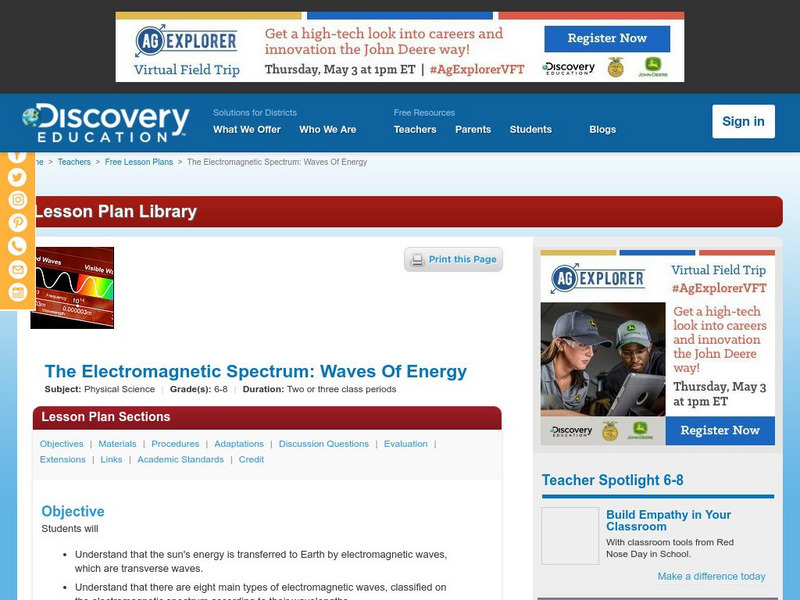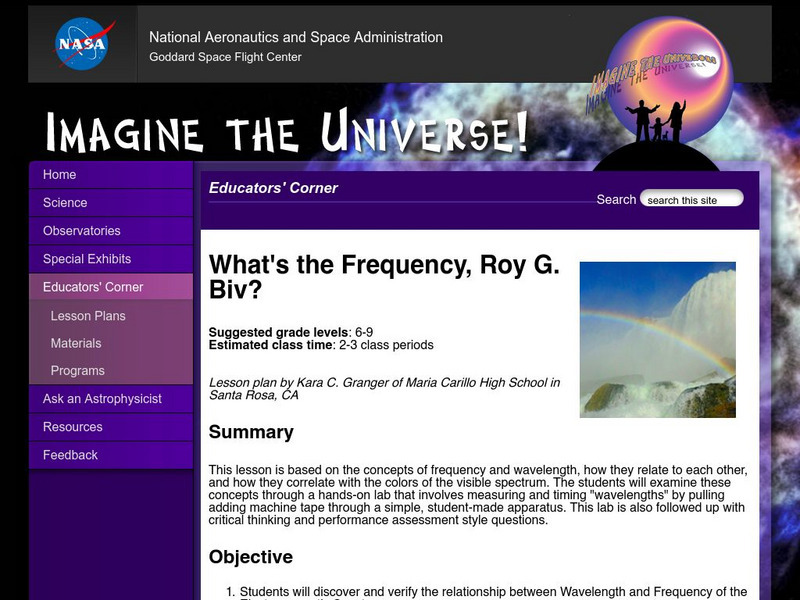Curated OER
Sea Ice Research
Students study sea ice and its importance in climate and climate change. They discuss sea ice as a presence of a food source for marine animals in the arctic and complete a lab activity. After completing the lab, they watch a video...
Curated OER
Using Maps To Make Public Health Decisions Case Study: Wildfires in Mexico 2000
High schoolers study environmental health. Using actual NOAA satellite imagery, students investigate the basic concepts of mapping. They explore the relationship between monitoring satellite images and public health decision making.
Curated OER
A Look At Sunspots
Students research how the development of new technology has increased our knowledge of how the sun works. This lesson is part of a three-part series aimed at showing students how our knowledge of the universe must be inferred through the...
Curated OER
Making Waves with the Electromagnetic Spectrum
Young scholars explore various types of electromagnetic waves, the range of the spectrum, and common sources of electromagnetic waves.
NASA
Nasa: Tour of the Electromagnetic Spectrum: Visible Light
Visible light waves are the only electromagnetic waves we can see. We see these waves as the colors of the rainbow. Each color has a different wavelength. Red has the longest wavelength and violet has the shortest wavelength. When all...
South Carolina Educational Television
Etv: Nasa Online: Light: Scattering Light
An introduction to the concept of the visible light spectrum provided in an animated format.
Science Struck
Science Struck: Color Spectrum Chart With Frequencies and Wavelengths
Read about the visible light spectrum and learn the frequencies and wavelengths for each of the primary and secondary colors.
Florida State University
Florida State University: Molecular Expressions Microscopy Primer: Light and Color Refraction of Light
Comprehensive and sophisticated overview of light refraction includes an historical overview of the subject and explanations of the mathematics that underpin refractive indexes, the relative index of refraction, Snell's law, and light...
Science Struck
Science Struck: Wavelength of Visible Light Spectrum
Explains where visible light fits into the electromagnetic spectrum and the wavelengths for the different colors we see.
TeachEngineering
Teach Engineering: Exploring the Electromagnetic Spectrum
Students learn the basics of the electromagnetic spectrum and how various types of electromagnetic waves are related in terms of wavelength and energy. In addition, they are introduced to the various types of waves that make up the...
Georgia State University
Georgia State University: Hyper Physics: Color
This site from Georgia State University discusses the location of visible light on the electromagnetic spectrum. Includes the wavelength values for various colors of light within the visible light spectrum.
Scholastic
Scholastic: Study Jams! Science: Energy, Light and Sound: Light
A video and a short quiz on the basic concepts and vocabulary for understanding light energy.
Ducksters
Ducksters: Physics for Kids: Light Spectrum
Kids learn about the science of the light spectrum. Wavelengths and frequencies of the electromagnetic waves including visible light, primary colors, and subtractive colors.
Physics Classroom
The Physics Classroom: Color Addition
This tutorial on the addition of color to light discusses the primary, complimentary, and secondary colors of light.
Physics Classroom
The Physics Classroom: Light Waves/color: Electromagnetic and Visible Spectra
This illustrated physics tutorial explains the electromagnetic and visible spectra of light using illustrated examples and interactive practice problems.
Discovery Education
Discovery Education: The Em Spectrum: Waves of Energy
Students are introduced to the electromagnetic spectrum through this group research activity. Each group investigates a different wavelength range within the em spectrum and reports back to class. Discussion ideas also included.
University of Colorado
University of Colorado: Physics 2000: Temperature and Absolute Zero
A thorough, multipage discussion of color and color television sets that explains how an image is formed on the television using red, green, and blue light. Understandable discussion, excellent graphics, and many interactive Java applets.
Physics Central
Physics Central: Physics in the Snow: Snowy Colors
A simple experiment through which students observe the connection between color and heat and prove that dark-colored objects and light-colored objects heat at different rates, even when exposed to the same heat or light source.
TeachEngineering
Teach Engineering: The Energy of Light
In this introduction to light energy, learners learn about reflection and refraction as they learn that light travels in wave form. Through hands-on activities, they see how prisms, magnifying glasses and polarized lenses work. They also...
PBS
Nova Teachers: Einstein Revealed: What's Your Wavelength: Classroom Activity
Investigate the wavelength properties of visible light and the scattering effects of the earth's atmosphere on different wavelengths.
NASA
Nasa: Imagers: The Electromagnetic Spectrum
NASA site provides information on waves, electromagnetic waves and their wavelengths.
CK-12 Foundation
Ck 12: Physical Science: Color
[Free Registration/Login may be required to access all resource tools.] Overview of the different colors in visible light and how they relate to its wavelength, how a prism separates visible light into its different colors, the colors of...
TeachEngineering
Teach Engineering: Graphing the Rainbow
Students are introduced to different ways of displaying visual spectra, including colored "barcode" spectra, like those produced by a diffraction grating, and line plots displaying intensity versus color, or wavelength. Students learn...
NASA
Nasa: Imagine the Universe: What's the Frequency, Roy G. Biv
In this very detailed lesson plan from NASA, students investigate wavelength and frequency within the electromagnetic spectrum.


















